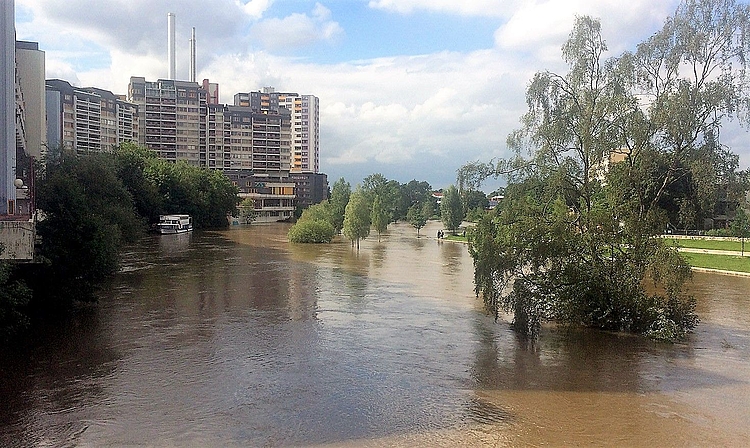Space-Time Dynamics of Extreme Floods (SPATE)

| Led by: | Prof. Dr.-Ing. Uwe Haberlandt (Subproject SP7) |
| Team: | Dr. Ing. A. Fangmann; L. Thiele, M. Sc.; R. Pidoto, M. Sc. |
| Year: | 2017 |
| Funding: | Deutsche Forschungsgemeinschaft, Förderkennzeichen 2416 |
| Duration: | 06/2017 - 05/2023 |
Floods have a profound social significance due to their high damage potential. Due to their inherent non-linear interactions and feedbacks with the atmosphere and catchments, they are also a scientifically challenging topic that requires a holistic and interdisciplinary investigative approach. However, extreme floods are not yet sufficiently understood. Newly available high-resolution datasets as well as new concepts for quantifying the interactions promise a significant improvement in understanding. The aim of this research group is to understand the atmospheric processes associated with extreme floods, as well as the processes occurring within catchments and river networks, and to establish spatial temporal relationships. In particular, flood genesis, spatial and temporal variability, as well as uncertainty and predictability are to be investigated.
How well extreme floods can be predicted for unobserved locations in the coming decades and the magnitude of uncertainties will be investigated in sub-project 7 "Predictability of extreme events". Flood forecasting is understood as the estimation of flood quantiles of given annualities at unobserved locations and / or future points in time. Predictability subsequently describes the quantification and attribution of uncertainty. The improvement of forecast skill for unobserved sites and future points of time in terms of accuracy and robustness is of central importance within the sub-project. The focus is on the differentiation of flood genesis, i.e. the flood-triggering processes within the forecast. Furthermore, the determination and reduction of uncertainty receives special attention.
The sub-project comprises two phases. In the first phase, investigations are carried out under the assumption of stationarity for flood peak flows within Aller-Leine catchment of the federal state of Lower Saxony. This procedure describes univariate stationary flood statistics. In the second phase, both temporally variable processes and other varying flood characteristics, such as volume and duration, are considered. This procedure describes the multivariate, transient flood statistics. In addition, the findings of the first phase are to be generalised and validated by means of the Neckar catchment study area and adapted if necessary.
The first phase is divided into three work packages. The first work package focuses on data-driven flood forecasting. The second work package includes the development of stochastic climate time series, which are required in the third work package as input data for the model-based flood forecasts.
A detailed description can be found here.
For the latest news, activities and publications of the SPATE research group, please see the biannual newsletter at: https://www.spate.ruhr-uni-bochum.de/spate/newsletter.html.de.
